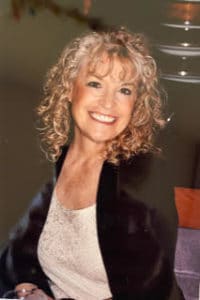Q: Where do you live?
A: Pleasant View, Utah (north of Ogden, Utah).
Q: How old were you when you were diagnosed with breast cancer?
A: I was 58 years old when diagnosed.
Q: What was/is your diagnosis?
A: I was diagnosed with Invasive Ductal Carcinoma, Grade 1, estrogen/progesterone positive, Her2 negative.
Q: Can you describe some of the feelings that came with your diagnosis?
A: At the time of my diagnosis on December 18, 2019, I was anxious and concerned about the future, but I also felt a great sense of peace that everything would be okay. When I got the call-back after my screening mammogram, I wasn’t too concerned, thinking there was something wrong with the scan. When I went for the follow-up and they showed me the mass, I was very upset and I went to my car and cried. The biopsy was pretty painful and stressful. I was glad my husband was there with me, but my emotions were pretty raw. I had 5 days between the biopsy and my sit-down discussion with the doctor regarding my diagnosis. That gave me time to process it and feel the sense of calm that everything would be okay. My doctor and nurse navigator were AMAZING throughout the process and I felt they genuinely cared about me.
Q: Are you still in treatment? Or how long did treatment take?
A: It was determined that because of the nature of my cancer, chemotherapy would provide no substantial benefit, so it was not prescribed. I had a lumpectomy on January 23, 2020, and I completed brachytherapy radiation February 28, 2020. Active treatment took about 5 weeks. I am on long term anti-hormone medication for 5 additional years.
Q: What type of treatment did you go through?
A: Lumpectomy, Brachytherapy, and anti-hormone medication.
Q: Tell us how you felt during treatment. In real words.
A: I felt pretty good during recovery from surgery. I was fortunate to be able to take paid time off work, so I took 2 1/2 months to recover and for my radiation treatments. Brachytherapy was a fascinating process! I went in early Monday morning and they placed the brachytherapy device in the cavity where my lump had been. The best way to describe the device is that it looked like a big whisk. I went in twice a day to have a radioactive ‘seed’ (iridium) sent in lead wires through the different sections of the ‘whisk’ to radiate the tissue surrounding the location of the tumor. That Friday afternoon they removed the device and my treatments were complete. During that week while the device was inside my breast, it felt pretty weird and it was a little difficult to sleep, but the actual radiation was painless and easy. I was very grateful to get the device out recently.
Q: Did you have any cravings?
A: I don’t remember having any cravings during treatment.
Q: Did anything completely turn you off?
A: I don’t remember this being an issue.
Q: Describe your support system during your journey.
A: My husband was my biggest fan and supporter during my journey. I was also blessed to have my 4 kids and my grandchildren support me! My daughter is a registered nurse and oversaw the medical portion of my journey. I also had a lot of friends at work and in my faith community who took extra good care of me during this time. I truly felt loved.
Q: Have any of your relationships changed since experiencing breast cancer?
A: Yes – I think all my significant relationships have changed. Having a serious health diagnosis tends to make you and others more grateful for the precious blessing of life. I think I have found greater joy in my marriage and with my children, their spouses, and my grandchildren.
Q: Have you gained new friends since your diagnosis? Yes!
A: I have gained some great friends who have also experienced breast cancer! I am a part of a monthly breast cancer support group and have enjoyed participating with Image Reborn activities!
Q: Use some descriptive words to describe your breast cancer experience.
A: Empowering, Life-changing, Life-affirming, Grateful, Blessed,
Adventurous, Scary, Nervous, Worried, Cautious, Peaceful, Spiritual, Loved.
Q: How has your life changed for the better since your diagnosis?
A: My life has changed in that I have realized what is important in my life and have n focusing on those important things. A year after my diagnosis, I retired from 34 years at my job to focus on those important things in life. I believe I am happier, more grateful for every day, and kinder to those around me. I look for ways to serve others and give back to those who helped make my experience a positive one.


